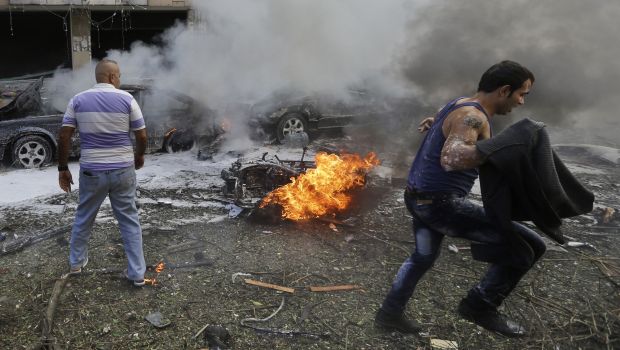
In this November 19, 2013 file photo, a man runs in front of a burned car at the scene where two deadly explosions struck near the Iranian Embassy in Beirut, Lebanon. (AP Photo/Hussein Malla, File).
Beirut, Asharq Al-Awsat—Lebanese authorities have announced the death of Majid Al-Majid, leader of the Al-Qaeda-affiliated group the Abdullah Azzam Brigades, who had been in detention by Lebanese intelligence since December 26.
The Lebanese army issued a statement on Saturday morning which said “detainee Majid Al-Majid died under treatment in the Central Military Hospital, due to deterioration to his health.”
The announcement came only one day after Lebanese authorities confirmed his arrest, confirming that his identity had been established by a DNA test.
Security sources previously told Asharq Al-Awsat on Friday that Majid was suffering from kidney failure and was in a coma.
The Lebanese government’s delegate to the Military Court, Saqir Saqir, confirmed Majid’s death and said that he had “tasked a coroner to determine the cause of death and produce a medical report in order to provide the Saudi embassy with all the facts.”
Majid, a Saudi national, was on that country’s ‘most wanted’ list on terrorism charges.
Caretaker government Justice Minister Shakib Qortbawi, told Asharq Al-Awsat that after the announcement of the death of a foreign national in Lebanon, “if the family or the country of the deceased do not want to receive the body, then arrangements are made to bury the body in Lebanon.”
He said the country concerned would send a request to the Lebanese Foreign Ministry to receive the body. The Foreign Ministry would then refer the request to the Justice Ministry, which “would then send the request to the general prosecution who will make the final decision on the issue.”
Omar Bakri Fustuq, a controversial Salafist preacher, told Asharq Al-Awsat on Saturday that “before Majid’s body is handed over to his family, the announcement of his death remains suspicious, especially that there are a number of probabilities which may have forced the announcement, such as his death under torture by interrogators who belong to parties affiliated to Iran and loyal to the Syrian regime, or that he really died from kidney failure, although Islamist websites said his health was not very poor.”
“Or maybe they wanted to have him isolated to get information from him about his groups and supporters in order to apprehend them,” he added.
Fustuq said it was strange that “the only leak about interrogating him refers to his admission that the car used in the Iranian embassy bombing was booby-trapped in the Ain El-Helweh Palestinian refugee camp, near Sidon, in southern Lebanon.”
Majid’s organization was reported to have claimed responsibility for the bomb attack on the Iranian embassy in Beirut in November, which killed more than 20 people.
Iran officially announced it would send a team to participate in the investigation of Majid’s activities, while Iranian Foreign Minister Mohammad Javad Zarif is expected in Lebanon on January 13 as part of a regional tour.
Majid was wanted by Lebanon and was sentenced in absentia to life in prison in 2009 on terrorism charges linked to his affiliation to the Fatah Al-Islam organization, and his role in the fighting against the Lebanese army in the Nahr Al-Bared refugee camp in northern Lebanon in 2007.
Fustuq said that according to his knowledge of the workings of jihadist groups, “when one of their leaders is detained or killed, a new leader is appointed within three days, because according to Shari’a, it is not allowed to leave any Islamist group without a leader for more than three days.”
He added that he expected the new leader to be announced “through an operation or an audio or video recording where he [the new leader] makes the announcement to his supporters.”
